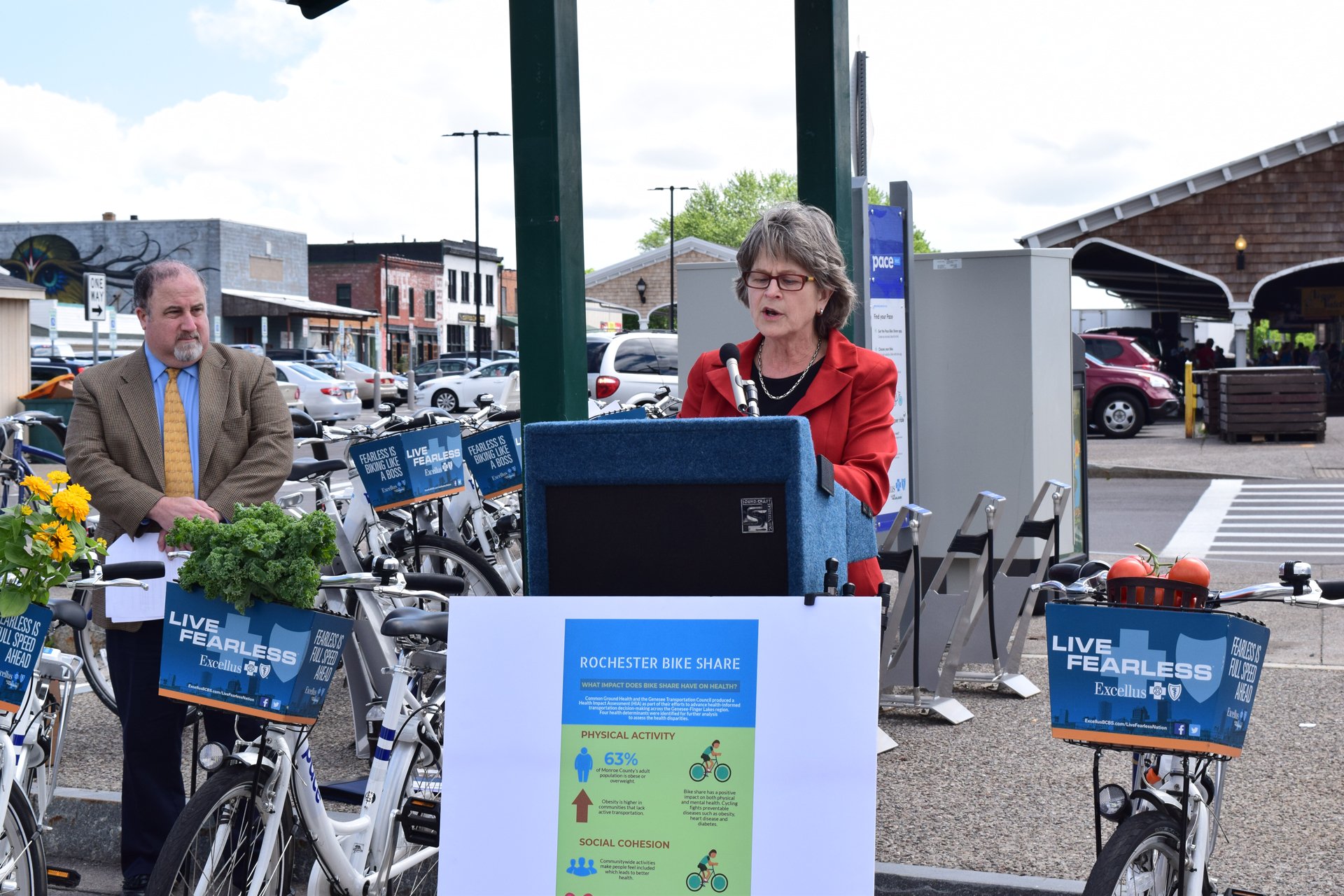
From left, James Stack, executive director of the Genesee Transportation Council, and Trilby de Jung, chief executive officer of Common Ground Health, speak at the Rochester Public Market about the potential for the Rochester Bike Share to help improve health outcomes for riders. June 19 they announced the release of a health impact assessment of the Rochester Bike Share.
Research shows that biking for transportation and recreation is linked to myriad health benefits, including lower rates of obesity, high blood pressure, stroke and cancer.
To tap into this health potential, bike share stations should be located close to grocery stores, parks and other community resources to encourage active transportation, and neighborhoods with poorer health should also be given priority when siting new station.
These are two of the recommendations to emerge from an extensive new Health Impact Assessment (HIA) from Common Ground Health and the Genesee Transportation Council.
“HIAs are an important new decision-making tool for policy makers,” said Trilby de Jung, CEO of Common Ground Health, the region’s health research and planning organization. “Informed by rigorous data analysis and broad community involvement, HIAs can help us take health into account before decisions are made on a project.”

The assessment identified 12 census tracks that would benefit the most from having access to bicycle stations and active transportation. The analysis was based on 10 measures, including rates of hypertension, obesity and poor mental health.
A relatively new approach in New York, this assessment is the state’s first HIA with a focus on transportation.
“We know we’re on the leading edge of using HIAs in transportation planning,” said Genesee Transportation Council Executive Director James Stack. “It has only been within the last few years that we’ve put an emphasis on using the HIA process to more prominently consider health in transportation. This is another tool we can use which might result in different recommendations than the traditional approach.”
The bike share assessment is the outgrowth of an 18-month process involving community input, data analysis and a review of national best practices. The study was guided by a committee of representatives from multiple sectors including city, county and state government, the University of Rochester and Conkey Cruisers, a community biking program.
To encourage healthier lifestyles that can combat chronic illness, the study also recommended:
- Improving the bike share payment system to allow residents without credit cards access to bikes
- Partnering with local institutions and groups to subsidize membership for low-income city residents
- Providing education about the use of the bike share program and the benefits of cycling
- Continuing to improve infrastructure such as bike lanes and sidewalks.
Rochester’s bike share vendor, Pace, has already embraced several of the recommendations, including offering more ways to pay for bike rentals and adding new bike stations around the city.
"We are proud to support Common Ground Health and the City of Rochester on their path towards building healthier communities," said Pace Market Manager Aviva Manin. "It is our shared goal that all Rochester residents and visitors have easy access to our bikes and all the benefits that come with them. From accepting EBT and cash payments to deploying accessible bikes, we will continue our efforts with the City of Rochester and its partners to ensure that all benefit from the transformative power that bikes have."
The study looked at four factors that affect public health, factors often referred to as the social determinants of health:
- Physical activity: Approximately 63 percent of Monroe County's adult population is obese or overweight. Providing opportunities in urban areas for increased active transportation encourages physical activity.
- Economic benefit and equity: Active transportation and cycling in particular can reduce personal transportation costs. According to the American Automobile Association, the average cost of owning a car was $8,469 a year in 2017. By contrast, most bike share programs cost $50 to $100 annually.
- Access to food: Poor access to supermarkets has been linked to increased health disparities, such as diabetes, heart disease and obesity. Bike shares offer a new way to travel to grocery stores, farm markets and other fruit and vegetable retailers.
- Social cohesion: Communities with greater levels of participation in community activities have better health outcomes than those with less engagement. Bike share has proven to be one of the most effective ways to introduce new riders to cycling, fostering further interest in active transportation.
HIA steering committee member Theresa Lou Bowick understands the importance of community involvement first hand. As the founder of the neighborhood bicycling program Conkey Cruisers and a champion of health benefits of cycling, Bowick was glad that the assessment included the perspective of residents.
“Many times, that’s the piece that gets missed,” said Bowick. “Somebody somewhere is making decisions and they may not know all of the pieces.”
Read the full report here.
Related coverage
OpenMicRoc - Pace Bike Share Celebrates 1 Year, Focuses on Accessibility
Democrat & Chronicle - Better access to bike share program can make us all healthier, report says
Rochester City Newspaper - Bike share has a health potential
Pew Trusts - Rochester Bike Share
Zagster - Rochester, NY: The Value of Health Impact Assessments to Bikeshare Programs


